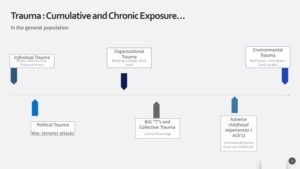Editor’s Note: Today, we turn over the blog to our friend Suzanne Spencer. Suzanne is a leadership consultant who has a great passion for community and for healing. We first got to know Suzanne in her capacity leading Delray’s Drug Task Force. A friendship ensued and we’ve had many conversations on a variety of subjects. We are pleased to share her thoughts.
By Suzanne Spencer
“We cannot prevent hurricanes or earthquakes, floods or volcanic eruptions. But we can ensure that both people and communities are better prepared and more resilient.” Miroslav Lajcak
Lately, through my research, I have come to gain a deep and rich understanding about the internal disruption that is often silent and occurs in our beliefs about our self; others; our emotional responses; how we see the world and come to understand our place in it. We unconsciously hold “assumptive beliefs” about the world in which we live.
One of these beliefs is that the world is benevolent and our impression that overall the world is good and that we can trust in the virtue of people. Then there is the assumption that the world is meaningful and that there is some sense-making out of experiences that happen to us and others in the world. Lastly, the belief that the self is worthy, the idea that we get what we put into life and there is some sense of predictability and control over our outcomes. (Janoff-Bulman, 1992).
What we may not realize is that trauma can cause a silent disruption to these worldviews. An internal shift can take place that causes damage to our individual and organizational systems. As the prevalence of trauma continues to increase, so too will our understanding as a greater society; as organizations; as communities; and as families of the effect that secondary trauma exposure plays in our everyday lives…. otherwise known as vicarious traumatization.
When we understand that trauma is an emotional response to an event or to an experience that is deeply distressing, then it is somewhat easier to see how we are increasingly witnessing (auditory, emotional, physical) and are exposed (whether direct or indirect) to traumatic experiences and events that are becoming cumulative and chronic.

I wonder.
What will be the long-term implications for our children, our families, our schools, our workplaces, and our society?
I worry.
Because a traumatized population starts to detach from those they love, things they love and communities they love. Traumatized people unknowingly make decisions out of fear, become desensitized to atrocities and lose their ability to feel empathy for each other.
I am hopeful.
That as pain spills into our personal and organizational systems, that we will respond to it as a cry for connectivity; belongingness; community and inclusion. We will adopt human-centered answers that reinforce our consciousness, recalibrate our organizational missions; recognize that our definitions of diversity and inclusion must expand beyond that of color, race, gender; and that resilience will be the antithesis to shattered world assumptions.
Suzanne Spencer is a Doctoral Candidate, M.S., Civic Activist
Human & Organizational Development Consultant
References
Janoff-Bulman, Ronnie (1989). “Assumptive Worlds and the Stress of Traumatic Events: Applications of the Schema Construct”. Social Cognition.
Janoff-Bulman, Ronnie (1992). Shattered Assumptions. New York: Free Press.


 We attended SUD Talks on Saturday night at the Crest Theater.
We attended SUD Talks on Saturday night at the Crest Theater.